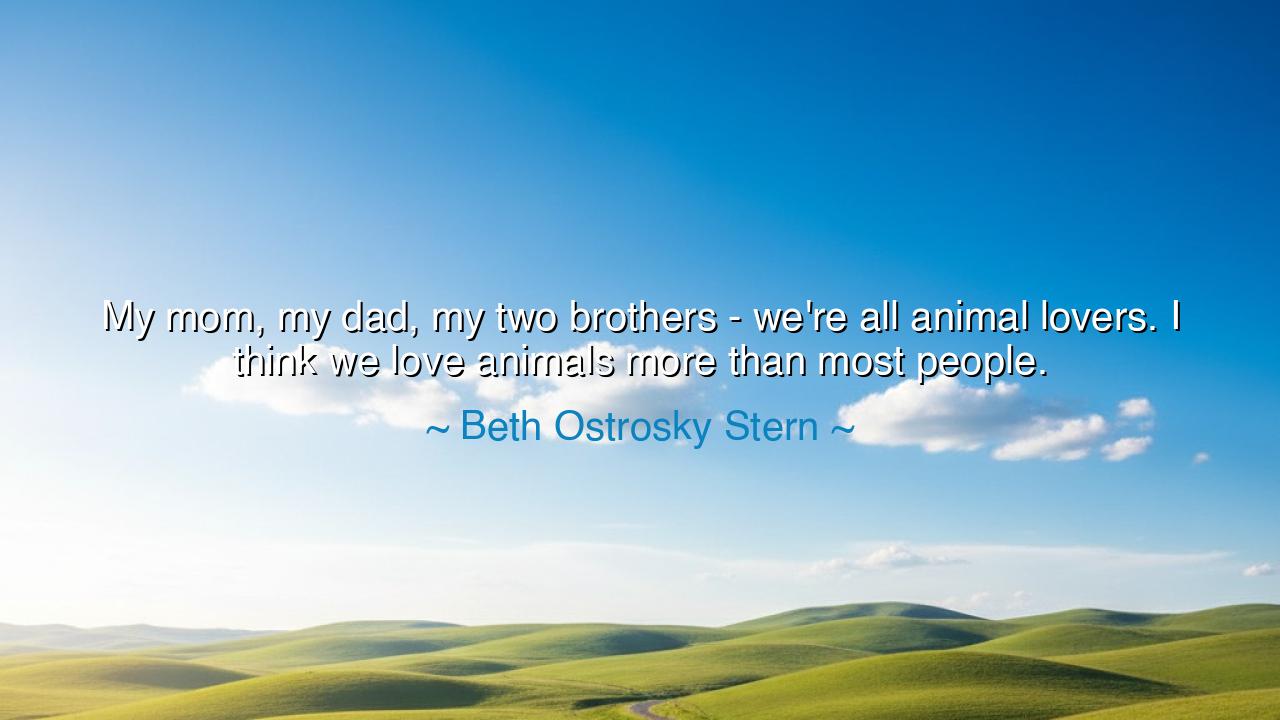
My mom, my dad, my two brothers - we're all animal lovers. I
My mom, my dad, my two brothers - we're all animal lovers. I think we love animals more than most people.






“My mom, my dad, my two brothers — we’re all animal lovers. I think we love animals more than most people.” In these tender words, Beth Ostrosky Stern speaks not merely of affection for creatures, but of a deeper harmony between the human heart and the living world. Her sentiment, simple and sincere, echoes the wisdom of the ancients who taught that kindness toward animals reflects the purity of the soul. For love that extends beyond one’s own kind — that recognizes the sacred breath in all beings — is among the highest forms of compassion.
To say “we love animals more than most people” is not a boast, but a confession of devotion — an admission that one’s spirit feels kinship with the voiceless, the gentle, the innocent. In every age, there have been souls who sensed this bond instinctively: those who, seeing the eyes of an animal, felt the same pulse of life that beats within themselves. The philosopher Pythagoras taught that the essence of life is shared among all creatures, and that to harm one is to wound the harmony of the cosmos. Likewise, in Eastern thought, the principle of ahimsa, or nonviolence, arises from the same truth — that all life is woven from the same sacred thread.
When Beth Ostrosky Stern remembers her family — her mother, her father, her brothers — as bound together by their love for animals, she reveals a family not only united by affection, but by reverence. Such love teaches patience, gentleness, and humility. It teaches that strength need not dominate, and that care is not weakness but wisdom. The household that loves animals learns to live more tenderly with each other as well, for mercy, once awakened, does not confine itself to one form of life. It becomes a light that shines upon all.
History offers many examples of this truth. Consider Saint Francis of Assisi, who called even the birds and wolves his brothers. He saw in them not beasts, but companions in creation, each carrying a spark of divine beauty. When he spoke to them, it was not madness but recognition — he saw through the surface of flesh and feather to the unity of spirit that binds all living things. In modern times, men and women like Jane Goodall and Dian Fossey have carried this same flame forward, choosing not to rule over the creatures of the earth, but to listen to them — to honor their ways, their songs, their fears.
And yet, how many have forgotten this ancient bond? How many live surrounded by life yet blind to its worth? The world suffers not for lack of intelligence, but for lack of empathy. When one looks into the eyes of a creature — whether dog, bird, or elephant — and sees not a soul but an object, something essential in humanity is lost. To love animals is not sentimental — it is a reminder of our place within creation, a calling back to simplicity and grace. Those who love animals more deeply often love the world more deeply, for their compassion is not bound by borders of speech or tribe.
Ostrosky Stern’s reflection also carries a subtle message about the power of upbringing. The compassion of parents becomes the moral inheritance of children. When a father rescues a stray dog, when a mother pauses to feed a hungry bird, they are not performing small acts — they are planting seeds of empathy in the hearts of their children. These seeds grow quietly but firmly, shaping the way those children will treat others, both human and not. In loving animals, a family learns to love the fragile and the forgotten, to honor life in all its forms.
Let this be the lesson: to love animals is to remember that love is not ours alone to claim. It belongs to the whole earth — to every creature that breathes, to every being that feels hunger, warmth, and fear. Follow the example of Beth Ostrosky Stern and her family: let your compassion be wide as the sky, gentle as the hand that feeds, steadfast as the heart that protects. For when we love the creatures of this world, we honor the Creator of all.
And in that love, we find the truest reflection of ourselves — not as masters of nature, but as guardians of its beauty, humble participants in a shared and sacred life.






AAdministratorAdministrator
Welcome, honored guests. Please leave a comment, we will respond soon